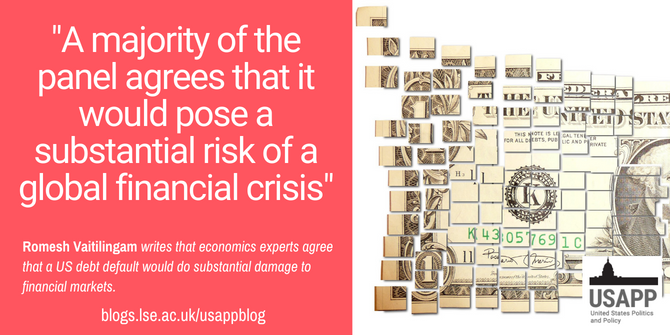 In January, the US federal government reached the debt ceiling previously set by Congress, and is now using extraordinary measures to meet its public spending obligations. The Initiative on Global Markets Forum at the University of Chicago Booth School of Business invited a panel of US experts to give their thoughts on what a US debt default would mean for financial markets, employment, and what the need periodically to increase the debt ceiling means for overall US debt. Romesh Vaitilingam writes that the survey shows that expert economists are concerned that a debt default could damage financial markets but are less certain about the impact on employment.
In January, the US federal government reached the debt ceiling previously set by Congress, and is now using extraordinary measures to meet its public spending obligations. The Initiative on Global Markets Forum at the University of Chicago Booth School of Business invited a panel of US experts to give their thoughts on what a US debt default would mean for financial markets, employment, and what the need periodically to increase the debt ceiling means for overall US debt. Romesh Vaitilingam writes that the survey shows that expert economists are concerned that a debt default could damage financial markets but are less certain about the impact on employment.
On January 19th the US federal government reached its current debt ceiling set by Congress, and the Treasury began using extraordinary measures to keep the government paying its bills.
Since 2011, the IGM Forum at the University of Chicago has convened a panel of US experts on economics to survey them every two to three weeks on key issues facing the US and the world. Amid political tensions about raising the debt limit, we invited our panels of experts in economics and finance to express their views on the potential effects of default, as well as the ceiling’s impact on the long-run size of the debt.
As part of our surveys, ahead of the February 1st meeting between President Biden and Speaker of the House Kevin McCarthy, we asked the US economics panel whether they agreed or disagreed with the following statements, and, if so, how strongly and with what degree of confidence:
a) A combination of the US federal government having to defer some invoice, benefit, and salary payments, and miss payments on Treasury securities for several weeks would do substantial damage to financial markets.
b) A combination of the US federal government having to defer some invoice, benefit, and salary payments, and miss payments on Treasury securities for several weeks would lead to substantially lower employment within six months.
c) The requirement to periodically increase the debt ceiling measurably reduces the long-run size of the debt.
At the same time, we put the third statement to our new finance panel, alongside the following statement:
Missing payments on the US Treasury security obligations for several weeks would pose a substantial risk of a global financial crisis.
The debt ceiling and financial markets
On the first statement about the potential impact of the federal government missing payments on its debt and security obligations for several weeks, a big majority of the panel of 35 expert economists who participated agreed that it would do substantial damage to financial markets. Weighted by each expert’s confidence in their response, 49 percent of the panel strongly agree, 39 percent agree, 10 percent are uncertain, and 2 percent disagree. More details on the experts’ views come in the short comments that they are able to include when they participate in the survey.
Among those who strongly agree, Darrell Duffie at Stanford (who is also a member of the finance panel) says: ‘Several weeks of missed payments on Treasury securities would shake confidence in the safe haven status of Treasuries, roil markets, and possibly cause market dysfunction of the sort experienced in March 2020.’ His Stanford colleague Kenneth Judd adds: ‘The US has a 200+ year commitment to pay its obligations, with the UK the only other large economy as reliable. World demand for US paper is high, reducing the cost of US borrowing. Any deviation from that could destroy its reputation.’
Among those who agree with the statement, Bengt Holmstrom at MIT notes: ‘The effects are uncertain and could erode credibility unpredictably.’ Larry Samuelson at Yale comments: ‘Hints that US debt is no longer utterly safe would have far-reaching effects.’ And in a remark that resonates with recent comments by Federal Reserve chairman Jerome Powell, Robert Shimer at Chicago states: ‘The Fed has said that it would not prevent a default, but it would surely attempt to mitigate damage to the financial system. It is unclear how effective that would be.’
Among panelists who say they are uncertain, Robert Hall at Stanford declares: ‘I question whether it meets the standard of substantial harm.’ His Stanford colleague Jonathan Levin suggests: ‘Seems very possible. But it would be new territory and how it unfolds could matter a lot.’ And Jose Scheinkman at Columbia concludes: ‘The effect will surely be negative but the magnitude is very uncertain.’
The debt ceiling and risks of a global financial crisis
Of our 40 finance experts (three of whom are also members of the economics panel), 37 participated in the survey. On the statement about the potential impact of the federal government missing payments on US Treasury security obligations for several weeks, a majority of the panel agrees that it would pose a substantial risk of a global financial crisis. Weighted by each expert’s confidence in their response, 26 percent of the panel strongly agree, 53 percent agree, 16 percent are uncertain, and 4 percent strongly disagree (totals don’t always sum to 100 because of rounding).
Many of the panelists who agree or strongly agree indicate how a crisis might arise from default on US government debt. Jonathan Parker at MIT explains: ‘A several week “technical default” by the US could lead to a significant decline in the demand for Treasury debt over years. Markets, anticipating this shift, could cause a large increase in US interest rates and crash in the dollar, which could cause a financial crisis.’ His MIT colleague Andrew Lo observes: ‘By risking default, the US is injecting risk into the holdings of both domestic and foreign investors. Such investors will respond to this risk as all rational agents do – by holding less US debt, increasing our borrowing cost.’
Stefan Nagel at Chicago provides more detail on the link to global markets: ‘Given the role of Treasuries as default-free benchmark in global financial markets, there is a risk of major disruptions (or, possibly, large Federal Reserve interventions to prevent disruptions).’ Janice Eberly at Northwestern agrees: ‘A default on US government debt would disrupt the Treasury market, which underpins global markets with expected safety and liquidity. Costly recent disruptions were not as fundamental as this scenario. There is also potential longer-run impact on US cost of funds and leadership.’
Other panelists who agree point to dangers to the country’s global role. Stijn Van Nieuwerburgh at Columbia argues: ‘If the US defaults with no quick resolution in sight, it may prove to be a turning point in which it loses its status as the global safe haven currency. What comes next is hard to predict since there is no natural alternate safe haven currency. A financial crisis may ensue.’ Amir Sufi at Chicago concurs: ‘It would definitely be bad for the US in its role as the provider of a safe reserve currency, but the exact way in which it could cause a global financial crisis is harder to assess. The 2011 situation [discussed in this study] offers a guideline, although debt limit there wasn’t hit.’
Further panelist comments explore the uncertainties around possible outcomes. Ralph Koijen at Chicago replies: ‘While the magnitude of the disruption will presumably depend on how long this is expected to last, there seems to be a significant risk to Treasury markets that are very central to broader financial markets.’ Laura Starks at UT Austin: ‘The uncertainty surrounding the missed payments and any resultant effects will depend on a number of factors, most particularly, how investors think about the missed payments and the reputation of the safety of US Treasury obligations.’
Among finance panelists who say they are uncertain, Matteo Maggiore at Stanford remarks: ‘It would certainly not be a positive event, but the details would matter. It mostly would introduce an ‘incompetence risk premium’ into Treasuries by making it clear that the political system is now so dysfunctional that even the federal debt repayment can be used for bargaining.’ John Campbell at Harvard: ‘Missing Treasury payments would certainly increase the risk of a financial crisis, but I think a crisis remains unlikely even in that scenario. The downside is so extreme that it is important to avoid this situation.’
John Cochrane at Stanford goes further: ‘Delaying payments for weeks would cause problems, but not obviously a huge crisis. Regulators would quickly allow Treasuries as collateral anyway. Not good, not known, big uncertainty, but could be Y2K [the computer programming issue at the turn of the millennium which caused far fewer issues than had been predicted]. That Treasury cannot issue more debt to offer bailouts might be bigger.’ The one panelist who strongly disagrees, Campbell Harvey at Duke, protests: There are plenty of actions that can be taken to reduce the risk of a default. More importantly, this would be a “technical” default. The US is not in distress and it is very unlikely that a technical default would trigger a global financial crisis.’
The debt ceiling and the wider economy
On the second statement put to the economics panel – about whether the federal government missing payments on all its obligations for several weeks would lead to substantially lower employment within six months – there is much more uncertainty in the opinions. Weighted by each expert’s confidence in their response, 10 percent of the panel strongly agree, 39 percent agree, 41 percent are uncertain, and 10 percent disagree.
Among those who agree, Larry Samuelson responds: ‘This one is less clear, but it is possible that the turmoil in the financial markets would spill over into significant real effects.’ Bengt Holmstrom concurs: ‘If instability in credit markets ensue, there would be spillovers to labor markets’; while Kenneth Judd warns: ‘The short-run impact may be small. The major dangers are the long-term consequences.’
Anil Kashyap at Chicago (who is also a member of the finance panel): explains how default might affect the real economy: ‘Certainly in the first few months there would a lot of damage to the economy, imagine people really not getting social security checks… There will be some recovery by six months, if interest rates are permanently higher then the damage could still be evident six months later.’
Among those who say they are uncertain, Daron Acemoglu at MIT objects: ‘Unlikely to see such strong employment effects in such a short time. But uncertain overall.’ Robert Shimer: cautions: ‘This depends on how effective the Fed is at preventing damage to the financial system. Missed payments could be catastrophic, or they could have only a transitory impact on the economy.’ Robert Hall disagrees with the statement, pointing to his research with Marianna Kudlyak.

“Torn & Cut One Dollar Note Floating Away” (CC BY 2.0) by photosteve101
The debt ceiling and the public finances
We also asked both the economics and finance panels whether the requirement to periodically increase the debt ceiling measurably reduces the long-run size of the debt. Weighted by each expert’s confidence in their response, 8 percent of the economics panel agree, 12 percent are uncertain, 30 percent disagree and 50 percent strongly disagree. Among the finance panel (again weighted by each expert’s confidence in their response), 12 percent agree, 20 percent are uncertain, 34 percent strongly disagree, and 34 percent. Overall, across both panels, 10 percent agree, 16 percent are uncertain, 32 percent disagree, and 42 percent strongly disagree.
Among the minority who agree, John Cochrane claims: ‘It’s popular to deny this, but in my view it has some effect. The regular budget process is completely broken. This is one deadline that forces some spending/tax compromises. Not as much as we might like, but would be worse without this last overall budget mechanism.’ John Graham at Duke suggests: ‘The ceiling imposes some discipline… but in the end costs are not reduced too much via the debt ceiling process.’ And Campbell Harvey proposes: ‘It is a constraint – but the constraint is usually not binding. We don’t know what the debt would be today in the counterfactual (no debt limit). The US has a structural deficit. Why not develop a strategy to fix that rather than just focusing on raising the limit?’
David Autor at MIT also agrees, remarking: ‘I’m not endorsing the nuclear approach to deficits, but it seems plausible that Republicans’ ability to hold Democrat administrations hostage over the debt ceiling extracts some meaningful budget concessions. Republicans didn’t use this power with Trump. Selective concern and hypocrisy abound.’
Among those who say they are uncertain, Daron Acemoglu states: ‘There are both positive and negative effects, but overall it’s a very inefficient way of managing public debt’; while Robert Shimer observes: ‘As is, the debt ceiling debates do have an impact on spending, as seen during the ‘fiscal cliff’ in 2013. But without a debt ceiling, those reductions might happen as part of normal budget negotiation.’
Among those who disagree or strongly disagree, Michelle Lowry at Drexel comments: ‘To this point, there is little evidence of such an effect. However, it seems that it might have a measurable effect in the future, if debt levels continue to increase.’ Paola Sapienza at Northwestern adds: ‘Hard to test it empirically but it does not look like.’ Steve Kaplan at Chicago (who is a member of both panels): ‘Debt ceiling has not stopped US debt from growing to record levels.’
Two experts look back at past political tensions around the debt ceiling. Janice Eberly says: ‘Focus on fiscal issues is needed, but the debt ceiling is usually routinely raised and has not led to focused and lasting reductions in fiscal deficits. Moreover, concerns over political stalemate have the opposite effect, as with the volatility and downgrade in 2011.’ And Jonathan Parker points out: ‘Historically, the debt ceiling has been raised each time we have hit it. It is hard to believe debt-to-GDP could have risen even more rapidly. And there are technical work-arounds (that we may yet use) that can allow debt to be issued without increasing its face value.’
The politics of the debt ceiling
Finally, some panelists express exasperation with the political process around the debt ceiling – and the potential costs for the country. Andrew Lo declares: ‘Periodically requiring Congress to engagement in brinksmanship has little bearing on fiscal responsibility. We should pay our bills.’ Stijn Van Nieuwerburgh warns: ‘The debt ceiling has been turned into a political weapon that substitutes for sound budgetary policy-making. It risks eroding the convenience yields that the US has benefited from for decades and that would be very unhelpful to lose right now with debt/GDP near 100 percent.’
Kenneth Judd adds: ‘The main effect in the past has been the silly political posturing that comes with these increases. The expectation has been that the debt ceiling has no real impact.’ And Richard Thaler concludes: ‘It is a stupid rule that serves no useful purpose. I predict it will be solved in the last 24 hours of some deadline.’
- The survey is conducted regularly on different topics by The Initiative on Global Markets, of the University of Chicago Booth School of Business. All comments made by the experts are available in the full survey results for the economics panel, and the finance panel.
- Please read our comments policy before commenting.
- Note: This article gives the views of the author, and not the position of USAPP – American Politics and Policy, nor the London School of Economics.
- Shortened URL for this post: https://bit.ly/3HFeAaZ






